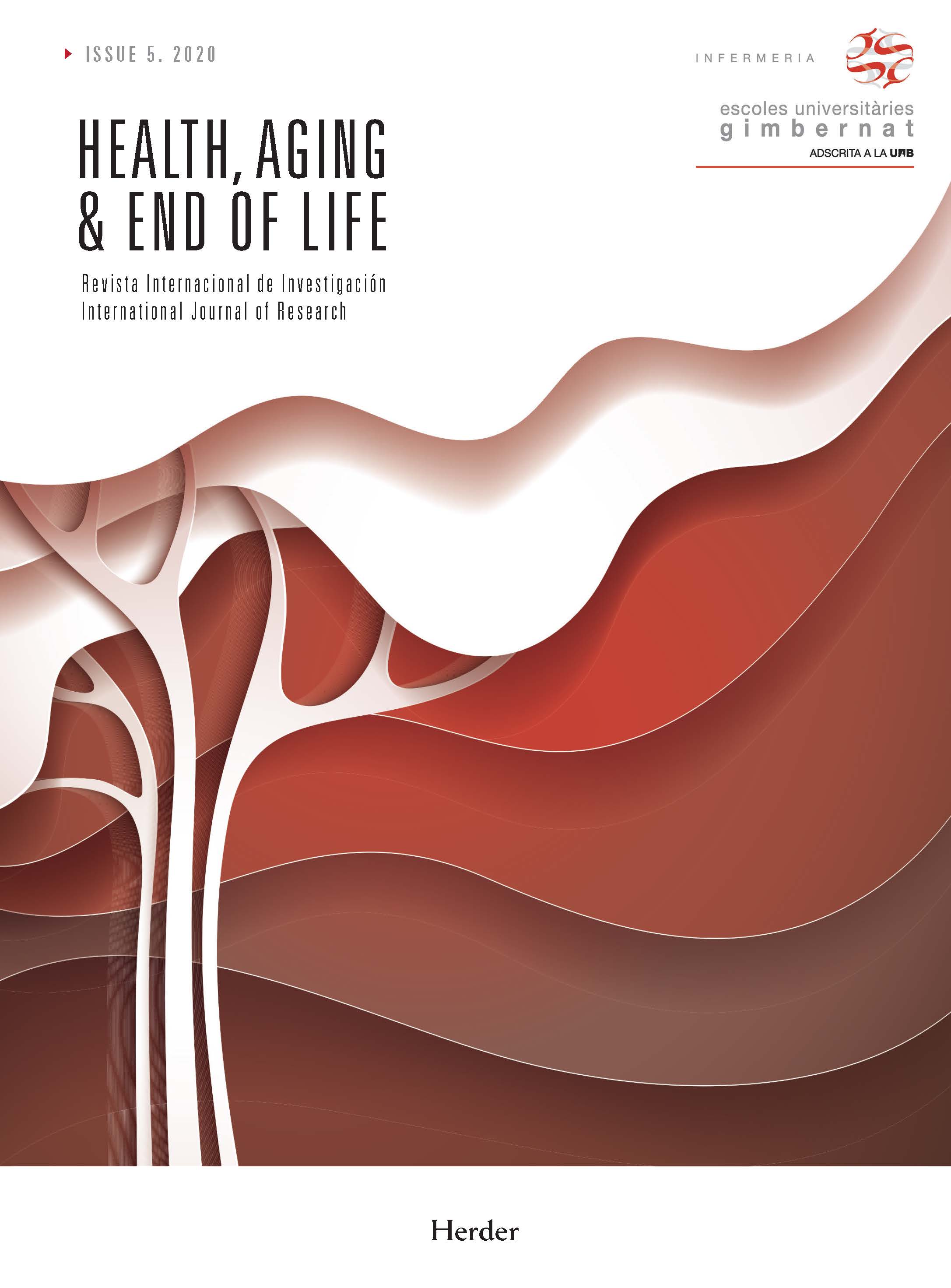Abstract
With increasing life expectancy, fragility is concentrated in recent years, and a need for long-term care, some people will live and die in nursing homes. Staff in nursing homes need to know the preferences of each person in the end-of-life process, and to respect wishes and decisions to help people have a dignified death.
Objective: To know what psychosocial care is like in the end-of-life process that is given to people living in nursing homes, how it is perceived by staff, and to analyze the use that is made of the Advance Care Planning.
Methodology: Study carried out with staff from interdisciplinary teams in older adults care centres. The sample is made up of 69 workers from 12 residential centers. Results: Only half of the professionals talk to people about their wishes and wills in the end-of-life process. Half of the professionals say that decisions about the dying process are not made with the family and the person involved, nor is a consensus reached with them. Reporting on the Advance Care Planning would be of great importance, but many residents do not have it drawn up upon admission nor do they do so during their stay in the center.
Conclusion: The results show the need to train professionals and the importance of communicating with the family. The professionals of the nursing. homes need to know and improve in all the aspects that intervene in the care at the end of life, so that the decisions are made according to the wishes of the people.
References
Abellán, A., Aceituno, P., Pérez, J., Ramiro, D., Ayala, A., Pujol, R. (2020). Un perfil de las personas mayores en España, 2020. Indicadores estadísticos básicos. Informes Envejecimiento en Red, 25. Madrid: CSIC.
Barrio, I.M., Barreiro, J.M., Pascau, M., Júdez, J., Simón, P., Molina, A., Gilarranz, S. (2006). La dependencia en el decir de los mayores. Gerokomos, 17 (2), 17-25.
Cornally, N., Coffey, A., Daly, E., McGlade, C., Weathers, E., O’Herlihy, E., O’Caoimh, R., McLoughlin, K., Svendrovski, A., Molloy, W. (2016). Measuring staff perception of end-of-life experience of older adults long-term care. Applied Nursing Research, 30, 245-251.
Fernández-Alcántara, M., García-Caro, M.P., Pérez-Marfil, M.N., Cruz-Quintana, F. (2013). Experiencias y obstáculos de los psicólogos en el acompañamiento de los procesos de fin de vida. Anales de Psicología, 29(1), 1-8. http://dx.doi.org/10.6018/analesps.29.1.139121
Ferrand, C., Martinent, G., Deliot, M., Pont, V. (2019). Need satisfaction and frustration in older people living in French nursing homes. GeroPsych, 32 (2), 69-77. https://doi.org/10.1024/1662-9647/a000205
Gala, F.J., Lupiani, M,. Raja, R., Guillén, C., González, J.M., Villaverde, M., Alba, I. (2002). Actitudes psicológicas ante la muerte y el duelo: Una revisión conceptual. Cuadernos de Medicina Forense, (30), 39-50.
Gómez, M.J., Medrano, J. (1998). La muerte en las residencias de ancianos: actitudes de las residencias y opiniones de los residentes. Revista Española de Geriatría y Gerontología, 33(1), 21-26.
Granero-Moya, N., Frías-Osuna, A., Barrio-Cantalejo, I.M., Ramos-Morcillo, A.J. (2016). Dificultades de las enfermeras de atención primaria en los procesos de planificación anticipada de las decisiones: un estudio cualitativo. Atención Primaria, 48(10), 649-656. DOI: 10.1016/j.aprim.2016.01.008
Guerrero, M., Gómez, R., Sánchez, R., Rodríguez, E., Montoya, R. (2016). Fin de vida en residencia de ancianos desde la perspectiva de los residentes: Revisión bibliográfica. Gerokomos, 27(2), 63-68.
Hanson, S., Brabrand, M., Lassen, A.T., Ryg, J., & Nielsen, D.S. (2019). What Matters at the End of Life: A Qualitative Study of Older Peoples Perspectives in Southern Denmark: A Qualitative Study of Older Peoples Perspectives in Southern Denmark. Gerontology and Geriatric Medicine, 5, 1-11. https://doi.org/10.1177/2333721419830198
Ke, L., Huang, X., Hu, W., O’Connor, M., Lee, S. (2017). Experiences and perspectives of older people regarding advance care planning: A meta-synthesis of qualitative studies. Palliative Medicine, 31, 394-405. doi:10.1177/0269216316663507
Lloyd-Williams, M., Kennedy, V., Sixsmith, A., et al (2007). The end of life: a qualitative study of the perceptions of people over the age of 80 on issues surrounding death and dying. Journal of Pain and Symptom Management, 34(1): 60-66.
Martínez, T. (2015). La atención centrada en la persona en los servicios gerontológicos. Modelos de atención e instrumentos de evaluación (Tesis doctoral) Universidad de Oviedo.
Mastaglia B., Toye C., Kristjanson L.J. (2003). Ensuring content validity in instrument development: challenges and innovative approaches. Contemp. Nurse, 14(3): 281-291. doi:10.5172/conu.14.3.281
Maza, M., Zavala, M., Merino, J.M. (2009). Actitud del profesional de enfermería ante la muerte de pacientes. Ciencia y Enfermería, 15(1), 39-48. Montoya, R. (2006). Aquellos que nos verán morir: Significado y respuesta de los profesionales sanitarios de una residencia de ancianos ante la muerte y los moribundos. Index de Enfermería, 15(52-53), 25-29.
Munn J.C., Dobbs D., Meier A., Williams C.S., Biola H., Zimmerman S. (2008). The end-of-life experience in long-term care: five themes identified from focus groups with residents, family members, and staff. The Gerontologist, 48(4):485-494.
Pinazo-Hernandis, S. (2020). La atención en residencias. recomendaciones para avanzar hacia un cambio de modelo y una nueva estrategia de cuidados. Universitat de València: Cátedra Prospect 2030. Recuperado de https://prospectcv2030.com/wp-content/uploads/2020/05/Infome_residencias.pdf
Sánchez-García, M.R., Moreno-Rodríguez, M., Hueso-Montoro, C., Campos-Calderón, C., Varella-Safont, A., Montoya-Juárez, R. (2017). Dificultades y factores favorables para la atención al final de la vida en residencias de ancianos: un estudio con grupos focales. Atención Primaria, 49(5), 278-285. DOI: 10.1016/j.aprim.2016.09.004
SECPAL (2016). Análisis y evaluación de los recursos de cuidados paliativos de España (n. 9). Madrid: Monografias SECPAL.
Steinhauser, K.E., Christakis, N.A., Clipp, E.C., McNeilly, M., Mcintyre, L., Tulsky, J.A. (2000). Factors Considered Important at the End of Life by Patients, Family, Physicians, and Other Care Providers. JAMA. 2000;284(19):2476-2482. doi:10.1001/jama.284.19.2476
Taboada, P. (2000). El derecho a morir con dignidad. Acta Bioethica, 6(1), 89-101 Twycross, R. (2000). Medicina paliativa: filosofía y consideraciones éticas. Acta Bioethica, 6(1), 27-46.
Vanzini, L. (2010). El trabajo social en el ámbito de los cuidados paliativos: una profundización sobre el rol profesional. Revista de Trabajo y Acción Social (47), 184-199.

